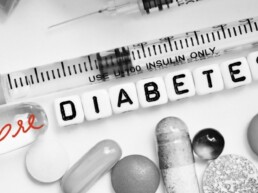Insulin resistance (IR) is a condition in which the body’s cells do not respond properly to insulin, leading to elevated blood sugar levels. Insulin, produced by the pancreas, regulates glucose levels in the blood by facilitating the transport of glucose from the bloodstream into cells where it can be used as energy. When cells become resistant to insulin, glucose accumulates in the bloodstream leading to hyperglycaemia, which can eventually lead to type 2 diabetes and other related health problems. The condition affects many people and can have serious implications for overall health and well-being, making it important to understand the causes, symptoms, and treatments available.
What diseases are associated with IR?
While insulin resistance is a key factor in the development of type 2 diabetes, people with insulin resistance are also at an increased risk for other related health problems such as cardiovascular disease, non-alcoholic fatty liver disease (NAFLD), and polycystic ovary syndrome (PCOS).
IR and Prediabetes
Insulin resistance can lead to prediabetes, a condition where blood sugar levels are higher than normal but not high enough to be classified as type 2 diabetes. Prediabetes is a warning sign that a person’s body is becoming less responsive to insulin. Such people are at increased risk of developing type 2 diabetes and other health problems. People with prediabetes can often reverse the condition by making lifestyle changes: losing weight, exercising regularly, and eating a healthy diet. It is important for people who are at risk of prediabetes to have regular check-ups and take steps to manage the condition.
What Causes Insulin Resistance?
The exact cause of insulin resistance is not well understood. But it is believed to be a combination of genetic and environmental factors.

Some of the factors that may contribute to insulin resistance include:
- Obesity: People with a high body mass index (BMI) are at an increased risk of developing IR. This is because excess fat cells can interfere with insulin’s ability to regulate glucose levels.
- Lack of physical activity: Physical inactivity can lead to IR.
- High-fat diet: A diet high in saturated and trans fats has been linked to IR.
- Age: As people age, their insulin sensitivity can decrease, increasing their risk of developing IR.
- Family history: People with a family history of type 2 diabetes are at an increased risk of developing IR.
Signs and Symptoms of IR
One of the most common signs of insulin resistance is elevated blood sugar levels, particularly after eating. Other symptoms can include:
- Fatigue and weakness
- Blurred vision
- Slow-healing cuts and bruises
- Dark, velvety patches of skin (acanthosis nigricans)
However, many people with IR have no symptoms at all. This makes it important to monitor blood sugar levels regularly to detect the condition early.
Can Insulin Resistance be reversed?
Yes! Here are some lifestyle changes that can help reverse insulin resistance:
- Weight loss: Losing weight, especially abdominal fat, can improve insulin sensitivity and reduce the risk of IR.

- Increase physical activity: Regular physical activity has been shown to improve insulin sensitivity. Aim for at least 30 minutes of moderate-intensity physical activity most days of the week.
- Eat a healthy diet: Eating a high-fibre, healthy diet, low in refined carbohydrates can help improve insulin sensitivity.
- Get adequate sleep: Getting enough sleep is important for overall health, including insulin sensitivity. Aim for 7-9 hours of quality sleep per night and establish a consistent sleep schedule.
- Limit alcohol consumption: Alcohol can interfere with insulin sensitivity. So it’s important to limit alcohol intake to reduce the risk of insulin resistance.
- Stop smoking: Smoking has been linked to insulin resistance and type 2 diabetes. Thus quitting smoking can help reduce the risk of these conditions.
- Monitor blood sugar levels: Regular monitoring of blood sugar levels can help track the progress of insulin resistance. It can also help track the effectiveness of lifestyle changes.
The Bottom Line
In conclusion, insulin resistance is a common condition that affects many people around the world. This is especially true for those who are overweight or obese, physically inactive, or have a family history of diabetes. IR can lead to a range of health problems, including type 2 diabetes, heart disease, and certain types of cancer. The good news is that it can often be prevented or reversed through lifestyle changes. Simply put, maintaining a healthy weight, exercising regularly, and eating a balanced diet is the way to go.
If you suspect that you have insulin resistance and would like to know how you can reverse it, get in touch. I am a Certified Type 2 Diabetes Prevention Lifestyle Coach aka Prediabetes Coach. Lifestyle changes, followed consistently, are key to the process. I can teach you how to make the necessary nutrition and lifestyle changes that have been proven to work. I can help you set goals and provide you with support and motivation to make lasting changes to your health habits. With my help, you can take control of your health and reduce your risk of developing type 2 diabetes. Contact me today to learn more about how I can help you manage your prediabetes diagnosis. Act today to reverse insulin resistance and improve your overall health and wellbeing.
SHARE

Madhavi Shilpi
Nutritionist
Prediabetes Coach
Related
Why Early Diagnosis of Prediabetes Is Key to Preventing Type 2 Diabetes
Introduction Imagine this: you’re feeling pretty healthy. Maybe you’re a…
32.8% of India Has Prediabetes — Are You Ignoring the Early Signs?
Introduction India is facing a serious health crisis: 32.8% of the…
How Modern Indian Diets Are Quietly Fuelling Insulin Resistance and Prediabetes
In today’s fast-paced world, the Indian diet is evolving to match modern…
5 ways to get sugar out of your life
Does that morning coffee and cookie leave you craving another treat two hours…
My story
Wondering who I am? And why I became a Nutritionist? Read on to get to know…
What is Prediabetes?
Have you been diagnosed with Prediabetes? Are you wondering what it actually…






